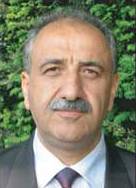Nuclear physicist
Mehran Tavakoli Keshe is a nuclear engineer involved with plasma reactors which are designed in analogy with cosmology. He postulates that the known inner core of Earth encapsulates a smaller hollow space of about 8 km diameter. This small center is filled with hydrogen, helium and other elements, and its acts like a semi-nuclear reactor. This reactor generates a proper magnetic field. This first magnetic field is superimposed by the second magnetic field which is created by convection. Similar to this approach Marvin Herndon, a US geophysicist, postulates a georeactor in the center of Earth, but filled with heavy radioactive elements. Keshe refers however to the solar system where the majority of the lightest elements, hydrogen and helium, are positioned in the center, in the Sun.
While this theory is not confirmed by the academic world, Keshe states that by applying his theoretical concepts in reactor prototypes he generates voltage and current, and is able to create graphene at room temperature and ambient pressure.
Mehran Keshe was born in Iran in 1958, as son to an X-ray engineer working for Philips and Siemens, and he was introduced to the world of radiation and nuclear at a very young age. In the mid-seventies he moved to the United Kingdom, Europe, for further education in the field of nuclear physics. In 1981 he graduated from Queen Mary, University of London as nuclear engineer specialized in reactor technology system control. At that time he developed a number of theoretical ideas related to more simple nuclear concepts and their applications, and the possibilities of using double magnetics fields inside reactors, which ideas were not accepted for testing by the nuclear industry. He then decided to enter into private international trading. While running his private business he developed further his nuclear concepts, and finally in 2002 he has decided to finish the full design of his ideas about nuclear technology. This includes the production of gravity and anti-gravity, and energy be the use of nuclear material in a clean and safe hydrogen fueled reactor.
Mehran Keshe introduced the concept of double magnetic fields, to explain the magnetic and gravitational field of Earth.
Unknown by the existing scientific community he wrote a number of scientific papers in 2004 and sent them for peer-review, such as "The creation of black holes". When one of the persons performing the peer-review used in public his information he decided to draw back his papers, and to concentrate further on the building of prototypes.
In 2004 Keshe was invited to Belgium by a semi-official organization for the evaluation of the technology, and his technology was examined by scientists at the VUB in Brussels from November of 2004 until March 2005. The report from the University concluded that the production of energy through his new technology "is feasible". Since early October of 2005 three international patents for the plasma reactor technology have been applied for, for all aspects of its possible use, covering some hundreds of applications.
At the end of 2005 and the beginning of 2006 several static plasma reactors were build, which proved the theoretical insights stated before. These static reactors work at room temperature and at normal atmospheric pressure, similar as the conditions claimed for cold fusion. These reactors provide voltage and current. Also deposits of pure carbon layers are generated in these reactors, and Raman spectroscopy performed by a well known scientific Institute has confirmed that these layers are wall-graphite of sp2, also called graphene.
Since the beginning of 2006 several prototypes of dynamic reactors are build, some specifically designed to create hovering effects, similar to effects sees with magnetic levitation. Keshe claims that basic hovering effects have been achieved.


